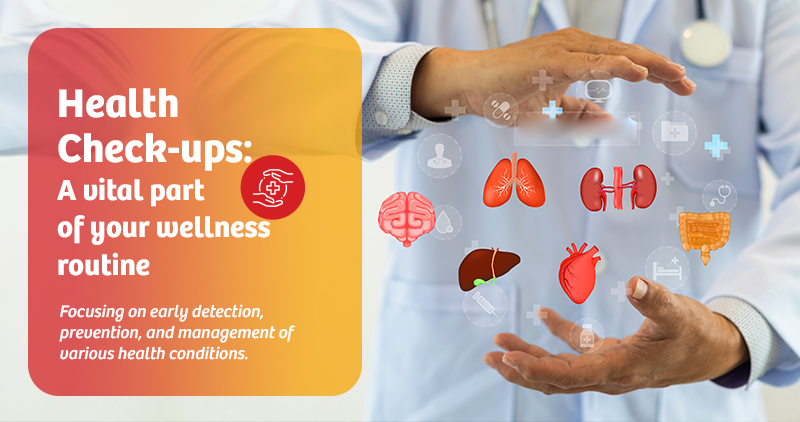

By Dr R. C. Damani
Consultant Internal Medicine
Jan 30, 2025
Health check-ups are essential to modern medical practice, focusing on early detection, prevention, and management of various health conditions. These check-ups provide critical insights into a person's overall health status and help to identify risks that may not be immediately apparent. Regular health assessments, informed by evidence-based medicine, involve a combination of physical exams, laboratory tests, imaging studies, and health screenings tailored to individual risk profiles. Let's understand why health check-up is important :
Many chronic diseases, such as hypertension, type 2 diabetes, and cancer, often present no immediate symptoms but can be detected through routine health check-ups. Early identification of these conditions is key to preventing progression and complications. For instance:
Hypertension is often referred to as the "silent killer" because it may go unnoticed until it causes significant cardiovascular damage. Blood pressure measurements during a check-up are essential to identify high blood pressure before it leads to severe conditions like heart disease, stroke, or kidney failure.
Hyperglycemia can indicate pre-diabetes or diabetes, conditions that can be asymptomatic but lead to serious complications, including neuropathy, retinopathy, nephropathy, or cardiovascular disease. A fasting blood glucose or HbA1c test during a check-up allows for the early management of these conditions.
Cancer screenings such as mammography (for breast cancer) and pap smears (for cervical cancer) are valuable in detecting malignancies at an early stage when treatment options are more effective.
Health check-ups are a cornerstone of preventive medicine, a field focused on preventing diseases rather than treating already-established conditions. These check-ups often include a combination of screening tests that can detect risks early on.
Lipid profile testing measures total cholesterol, LDL (low-density lipoprotein), HDL (high-density lipoprotein), and triglyceride levels, helping to assess the risk of atherosclerosis and cardiovascular disease.
C-reactive protein (CRP) and high-sensitivity CRP (hs-CRP) tests measure inflammation in the body, which is a risk factor for cardiovascular disease and atherosclerosis.
Genetic testing is becoming increasingly popular in health assessments to identify genetic predispositions to certain diseases, such as breast cancer (BRCA mutations), or rare inherited conditions like sickle cell anaemia.
For individuals with pre-existing chronic conditions like asthma, diabetes, and chronic kidney disease (CKD), regular check-ups are necessary for optimal management. These visits allow healthcare providers to monitor disease progression, adjust treatment plans, and mitigate potential complications:
Diabetes management includes monitoring blood glucose levels (e.g., through HbA1c testing) to ensure the patient achieves the desired target ranges. Diabetes management includes monitoring blood glucose levels (e.g., through HbA1c testing) to ensure the patient achieves the desired target ranges.
Asthma management involves periodic lung function tests, such as spirometry, assessing airflow obstruction and guiding treatment modification. For chronic kidney disease (CKD), routine urine tests (e.g., urine albumin-to-creatinine ratio) and blood tests (e.g., serum creatinine) are used to monitor kidney function and adjust medications to delay disease progression.
Health check-ups allow for a personalised risk assessment based on a person's medical history, lifestyle factors, and genetic predispositions.
These personalised risk assessments guide specific interventions:
For smokers, lung function tests (spirometry) or even CT scans for lung cancer screening may be recommended, depending on their age and smoking history.For individuals with a family history of heart disease, early cholesterol screenings, electrocardiograms (ECG), or even echocardiograms may be appropriate to assess heart function and detect any underlying arrhythmias or structural abnormalities.
Individuals with sedentary lifestyles or poor dietary habits may undergo nutritional assessments and recommendations for improving diet and physical activity. Advanced diagnostics, such as body composition analysis, may be used to assess body fat percentage and muscle mass, which provide additional insights into metabolic health.
Health check-ups involve qualitative and quantitative measures, enabling healthcare providers to track key indicators over time. By continuously monitoring factors such as blood pressure, cholesterol, or glucose levels, health providers can observe trends, adjust treatment protocols, and detect deviations from the norm early on. This longitudinal tracking is a vital aspect of personalised medicine, where treatment plans are adjusted to reflect changes in a patient's health over time.
Health check-ups serve as an integral part of a preventative healthcare strategy. These assessments are pivotal in improving patient outcomes and reducing long-term healthcare costs by enabling early detection, personalised risk management, and chronic disease monitoring. Integrating diagnostic tools such as lab tests, imaging studies, genetic screenings, and personalised medical advice ensures that health check-ups are essential for maintaining health, preventing diseases, and enhancing longevity. KD Hospital has a well-equipped health check-up department with an experienced team of doctors for earlier detection and cure.